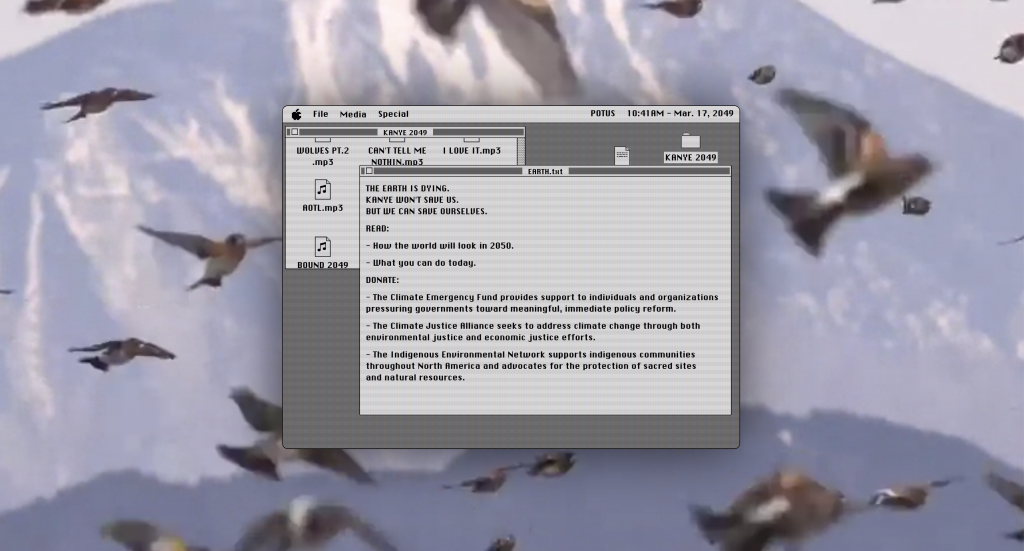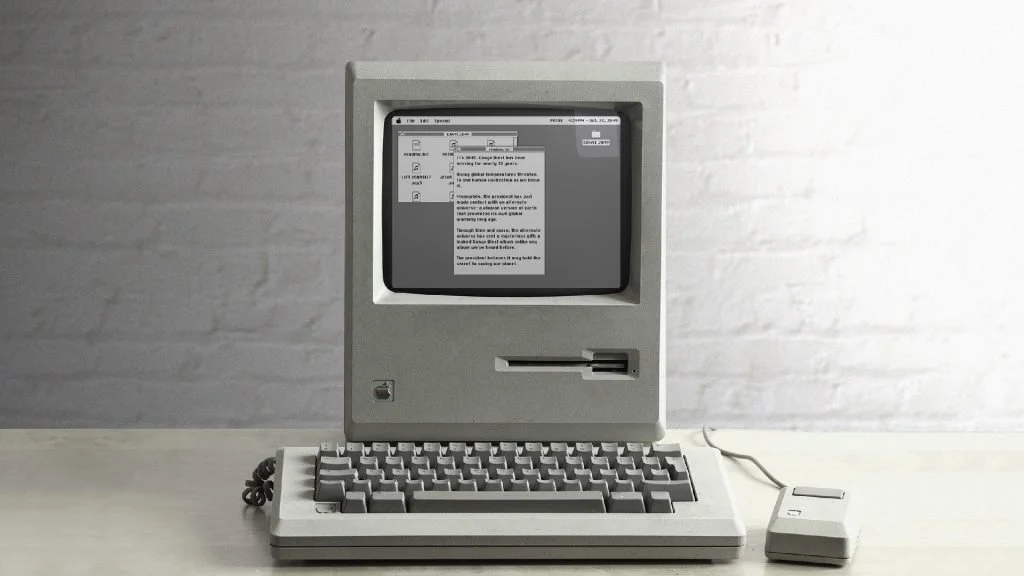Kanye West Won’t Save Us – But Toasty Digital Might
This piece originally ran on CentralSauce. You can view the original via the Wayback Machine.
The prospect of a new Kanye record has never been less enticing, but inspired remixer Toasty Digital has managed to piece together something better: a thrilling sampledelic celebration of Kanye West and the artists behind his many sounds and styles.
“It’s 2049. Kanye West has been missing for nearly 30 years.”
It’s already a powerful pitch, but there’s more to it. With a mounting climate crisis on their hands, the US government attempts to make contact with an alternate climate-conscious universe in order to consume their excess resources. It’s “like getting a pizza delivered, except the pizza is stolen from an alternate version of you,” explains a scientist, “a version who has handled their pizza more sustainably.” These are words that President Barron Trump understands and, the pizza analogy having convinced him, the scientists start up their transdimensional portal.
It works… kind of. Unable to sustain the portal, the scientists fail to pass through the gate, instead receiving but one item from that glowing future in the seconds before it slips away: a solitary flash drive. It doesn’t hold the answer to global warming, the final endpoint of humanity’s pride. If anything, it holds a potent form of hubris. On that flash drive, is… an interdimensional Kanye West album.
So begins Kanye 2049, the exceptional Yeezy edit from Toasty Digital that reshapes West’s two decades of artistry with palpable glee. More than just a vain re-edit of West’s greatest hits, the tape is a carnival of fun for any Yeezy fan, filled to the brim with inspired collisions, sly references and original conceits that pit his long and varied career against itself. It shows not only how different West has become, but how similar elements of his style have remained.
Oriented about a resolutely green ethos, Kanye 2049 uses its sci-fi conceit to call attention to a very real and ever-approaching climate crisis. The tapes website, courtesy of freelance designer starfennec, is cloaked in the retro sheen of an old school operating system, presumably the product of a resource-scarce future. The readme directs the listener to articles from the BBC and Time Magazine, shining a light on the climate emergency whilst featuring charitable organizations such as the Climate Emergency Fund, the Climate Justice Alliance and the Indigenous Environmental Network. It’s Kanye for a good cause, something you just can’t take for granted these days.
Really, Kanye 2049 is that and more. It’s a celebration of not only West himself, but the artists he sampled throughout his long production career, the acts he supported and mentored, the influences that helped him become the artistic titan he is today, and Toasty Digital, the producer who turned nearly twenty years of art into a thrilling, dynamic mixtape.
One of the key facets of Toasty’s toolkit is how he recreates these lush instrumentals: unable to access the stems, or raw files, from West’s workflow, he digs back into the sounds and samples that informed Yeezy. That means pulling all manner of breaks, phrases and licks from across decades of cultural history and recreating West’s own takes on fragments of soul, rock and electronica.
It’s a process that shines from the open, where Toasty pits the patient rhymes and razor-sharp dissonance of “All Mine” against the intricacy of Daft Punk’s “Harder Better Faster Stronger.” It’s a juxtaposition that calls back to the earliest moments of West’s electronic exploration, though in sampling directly from the original Daft Punk track, Toasty Digital manages to find a pocket that’s both familiar and unique. The track calls back to West’s “Stronger,” but in pursuit of a better arrangement, the producer borrows from a section of “Harder, Better, Faster, Stronger” previously unchopped on that Graduation single.
The intro then segues into the “FML” instrumental, adorned with Timothy West’s 1990 audiobook reading of Roald Dahl’s Revolting Rhymes. You might recognize it as the interpolated opening to “Dark Fantasy,” so memorably read by Nicki Minaj. The sample of that original audiobook recording not only evokes Nicki’s performance but illuminates the slight changes that were made to slot it into West’s vision. A “Love Lockdown” verse sits convincingly atop “FML,” a fusion that spans the better part of a decade, the track riding out on the all-too-pleasing blend. It’s staggering to think that by the time the intro finishes, it’s been little more than two-and-a-half minutes. These tracks go down like Kanye concentrate: sweet, undiluted, and bound to get the kids irresponsibly amped up.
Kanye 2049 takes the craft back to first principles, approaching West’s sounds like West would the catalogs of countless soul artists during his famously productive three summers. That careful intricacy doesn’t stop with the music: on the dedicated website, the accompanying video clips are hemmed with an aesthetic that’s more Windows 98 than Blade Runner.
The window trim adorns all manner of interjections throughout, usually pulling from clips of West and his collaborators performing. They’re frequently mislabelled in terms of filenames – in “POWER,” the “realfriends.jpeg” moves with the fluidity of a video clip; in “I LOVE IT,” a closeup of West’s ‘DONDA’ necklace is simply titled “ILOVEIT.MP3,” despite the fact that it too is a clip. They’re just fun little details that run throughout, the strictly curated clips adding another medium to the already conceptually rich project.
Toasty’s “POWER” uses West’s 2010 single as a launching point, with Dwele’s one-woman choir slowly unfurling into a loungy sketch of “Use This Gospel.” Old-school organ dances in the background and Kenny G’s formidable saxophone floats atop the mix, the only element that eclipses the powerful drums of Cold Grits’ “It’s Your Thing,” used by West on both “Power” and “Crack Music.” He throws in Frank Ocean’s “Solo” for good measure, the first sign that Kanye 2049 intends to reach into West’s rich tapestry of proteges, collaborators and onetime companions. It’s not the last cameo, but as a searing electric guitar underpins the “bull and the matador dueling in the sky,” it’s hard to say it’s not the best.
So ambitious are the flips within, it’s no surprise that some juxtapositions feel harsher than others. The synthesis of Kendrick’s “Backseat Freestyle” and Kanye’s 2015 mix of “Say You Will,” defined by Caroline Shaw’s intricately-layered choral arrangements, hits as one of the few moments where things feel out of place. The juxtaposition between the deliberate juvenilia of Kendrick’s youthful bars and the almost sacred heft of Caroline Shaw’s autotuned vocals is just too harsh. That Toasty overextends isn’t all that surprising, given the power that such juxtapositions can provide, the sheer depth of West’s catalog, and the resulting range of song combinations showcased across the mixtape. It’s like Yeezy once said: “reach for the stars, so if you fall you land on a cloud.“
“you look like a good Ye…”
In this case, that cloud is “AOTL,” an “All Of The Lights” remix that incorporates Ye’s “Ni**as In Paris” verse, Desiigner’s distinctive “Panda” contributions, and Yeezy’s oft-forgotten “Lollipop (Remix)” bars. Identifying each flip is a challenge in and of itself, sending the listener scrambling for a sound off little more than a hunch and a half-formed memory. It’s a thrilling game you can’t help but play, and though some might seem obvious, Toasty occasionally trawls the darkest depths of West’s catalog.
The “I Love It” edit might just be the best moment on the entire tape, a fact that no doubt comes as a surprise to the original song’s many detractors. A pitch-perfect assembly of the “I Love It” bass, Jay’s opulent “Otis” verse, and both the sharp percussion and swelling strings from Graduation favorite “I Wonder,” it finds melancholy and braggadocio in equal share. That Labi Siffre-inspired orchestration pulls at the heartstring even as Yeezy’s belligerent “Feedback” verse floats atop it — giving even his most assured bars the gentle grace of some dying dream.
It’s this control of mood that shines throughout, even when you’re too caught up in Yeezy to really notice. Toasty’s tonal shifts cut tracks into sharp fractions, often pulling three or four distinct emotions from a central sound. He slots Ye’s “Diamonds from Sierra Leone” verse atop the sorely neglected “Lift Yourself” beat, bringing a new brightness to his bars, only to transition into the sparse piano of “New God Flow,” tinting the same “Diamonds” verse with a brooding majesty. It cycles into “Send It Up,” moves into a stretch of Bill Withers’ “Rosie,” and closes out on a “Kids See Ghosts” epilogue. These switches are so sudden, and invocations so fleeting, that any lull is worth waiting on – if you don’t like a blend, simply let the tape play, and you’ll soon be treated to some other combination.
That might be the most impressive aspect of the entire project. Even amongst the noble cause, the impressive web design, the back-to-basics approach and the commitment to see it all through, it’s the sheer amount of transitions and phrases that inspire the most awe. Kanye 2049 could’ve been impressive as a simple mix-and-match exercise, but Toasty Digital clearly wasn’t content with a mere remix. He’s delivered something that’s far more dynamic than it needs to be, and while that means that the edits ebb and flow in terms of harmony, it also means there’s a stunning amount of range on display.
Take, for instance, his take on “Jesus Walks.” Pairing those Bush-era bars with the delicate “Closed on Sunday” instrumental seems a sensible fusion, but it’s never just that simple – the serrated edge of the “Christian Dior Denim Flow” fill cuts through the mix, the Royal Jesters’ “Take Me For A Little While” takes the reigns for a moment, and a late appearance from the “30 Hours” beat offers the cleanest synthesis of all. It even closes on a nice, funny subversion by way of Steely Dan’s “Kid Charlemagne,” and as anybody who knows me can attest, that’s a surefire way to my heart. It all helps show just how illusory that ‘old-new’ dichotomy is, at least musically: rearrange the pieces, and you can turn West’s darkest bars to a bittersweet celebration, or flip his brightest lyrics to a more menacing mood.
It’s easy to imagine that Kanye 2049 is the kind of intricate initiative that Kanye would enjoy – a sampledelic odyssey that plays like fuel to the fire of his ego – but without the oft-trite media circus that the man stokes before each and every release. The fact is, Kanye 2049 is a project befitting the Kanye West that you love, whichever that may be. If you love the ‘old’ Kanye, there’s plenty of that to be found, and if you like the ‘new,’ it’s got that in spades, too. It’s a brand new Kanye offering without brand new Kanye bars, which presumably would be about his divine affluence, or COVID, or how being a free thinker means never having to say you’re wrong. It’s a mixtape more stacked than all but the biggest major label releases, burnished by West’s ever-changing collaborators and shifting tastes in sampled sounds.
Toasty couldn’t have done it without West’s expansive catalog, but he certainly couldn’t have done it with the crates alone. There’s no substitute for skill, and when you hit play and sink into Kanye 2049, you know it’s the real deal. As it washes over you, think about the future – where will we be in 28 years? Where would you like us to be? Planning for our future shouldn’t be like waiting on a Ye project: the power is in our collective hands, and making a change is the first step.
If we wait on solutions like we wait on Good Ass Job, or Swish, or TurboGrafx16, or So Help Me God, or Yandhi, or that other Good Ass Job… well, it’ll be a Cruel Winter of our own making.


